高中英语中的近义词辨析实例分析
高中英语语法:英语近义词辨析
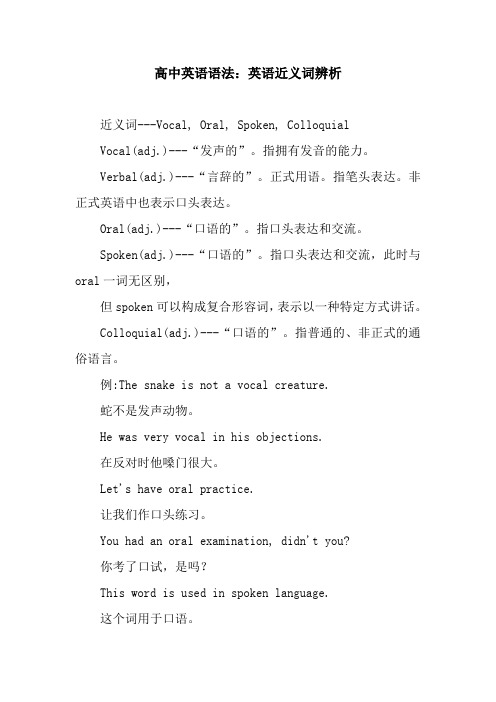
高中英语语法:英语近义词辨析近义词---Vocal, Oral, Spoken, ColloquialVocal(adj.)---“发声的”。
指拥有发音的能力。
Verbal(adj.)---“言辞的”。
正式用语。
指笔头表达。
非正式英语中也表示口头表达。
Oral(adj.)---“口语的”。
指口头表达和交流。
Spoken(adj.)---“口语的”。
指口头表达和交流,此时与oral一词无区别,但spoken可以构成复合形容词,表示以一种特定方式讲话。
Colloquial(adj.)---“口语的”。
指普通的、非正式的通俗语言。
例:The snake is not a vocal creature.蛇不是发声动物。
He was very vocal in his objections.在反对时他嗓门很大。
Let's have oral practice.让我们作口头练习。
You had an oral examination, didn't you?你考了口试,是吗?This word is used in spoken language.这个词用于口语。
She is a soft-spoken woman.她是一个说话柔和的女人。
This is a colloquial expression.这是通俗用语。
He studies English colloquial style.他研究口语体的英语。
近义词---View, Scenery, Scene, SightView(n.)---“景色”。
普遍用语。
指目中所望见的景色。
Scenery(n.)---“景色”,“外景”。
指一个地方乃至一个国家的整个外景或外貌。
Scene(n.)---“景色”。
可与view通用,但多包括了其中的人及其活动。
Sight(n.)---“光景”。
多指人工的事物,比如大建筑史迹等有名的处所。
例:There is a fine view of the mountain from our hotel window.从我们旅馆的窗口可以看到秀丽的山景。
高中英语同义词辨析
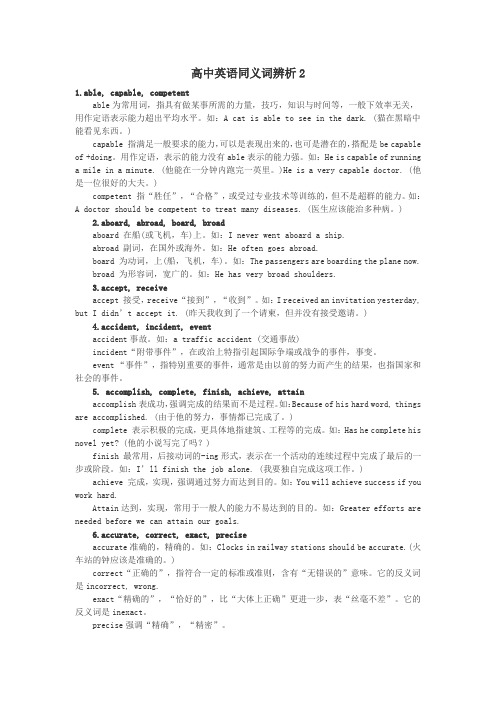
高中英语同义词辨析21.able, capable, competentable为常用词,指具有做某事所需的力量,技巧,知识与时间等,一般下效率无关,用作定语表示能力超出平均水平。
如:A cat is able to see in the dark. (猫在黑暗中能看见东西。
)capable 指满足一般要求的能力,可以是表现出来的,也可是潜在的,搭配是be capable of +doing。
用作定语,表示的能力没有able表示的能力强。
如:He is capable of running a mile in a minute. (他能在一分钟内跑完一英里。
)He is a very capable doctor. (他是一位很好的大夫。
)competent 指“胜任”,“合格”,或受过专业技术等训练的,但不是超群的能力。
如:A doctor should be competent to treat many diseases. (医生应该能治多种病。
)2.aboard, abroad, board, broadaboard 在船(或飞机,车)上。
如:I never went aboard a ship.abroad 副词,在国外或海外。
如:He often goes abroad.board 为动词,上(船,飞机,车)。
如:The passengers are boarding the plane now.broad 为形容词,宽广的。
如:He has very broad shoulders.3.accept, receiveaccept 接受,receive“接到”,“收到”。
如:I received an invitation yesterday, but I didn’t accept it. (昨天我收到了一个请柬,但并没有接受邀请。
)4.accident, incident, eventaccident事故。
高中中学英语语法:英语近义词辨析
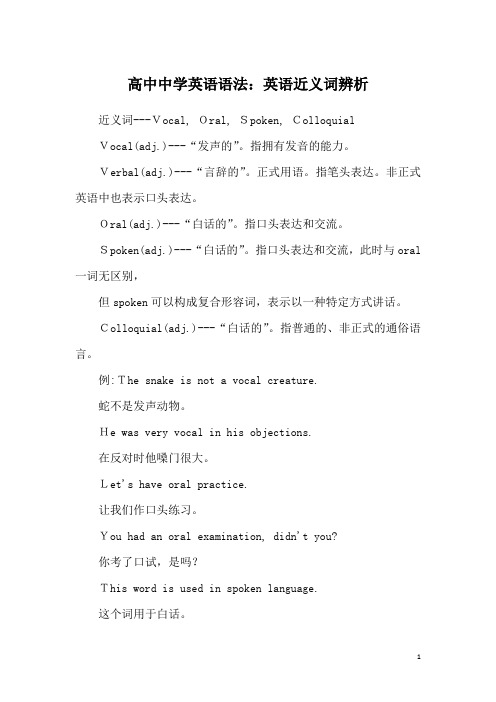
高中中学英语语法:英语近义词辨析近义词---Vocal, Oral, Spoken, ColloquialVocal(adj.)---“发声的”。
指拥有发音的能力。
Verbal(adj.)---“言辞的”。
正式用语。
指笔头表达。
非正式英语中也表示口头表达。
Oral(adj.)---“白话的”。
指口头表达和交流。
Spoken(adj.)---“白话的”。
指口头表达和交流,此时与oral 一词无区别,但spoken可以构成复合形容词,表示以一种特定方式讲话。
Colloquial(adj.)---“白话的”。
指普通的、非正式的通俗语言。
例:The snake is not a vocal creature.蛇不是发声动物。
He was very vocal in his objections.在反对时他嗓门很大。
Let's have oral practice.让我们作口头练习。
You had an oral examination, didn't you?你考了口试,是吗?This word is used in spoken language.这个词用于白话。
She is a soft-spoken woman.她是一个说话柔和的女人。
This is a colloquial expression.这是通俗用语。
He studies English colloquial style.他研究白话体的英语。
近义词---View, Scenery, Scene, SightView(n.)---“景色”。
普遍用语。
指目中所望见的景色。
Scenery(n.)---“景色”,“外景”。
指一个地方乃至一个国家的整个外景或外貌。
Scene(n.)---“景色”。
可与view通用,但多包括了其中的人及其活动。
Sight(n.)---“光景”。
多指人工的事物,比如大建筑史迹等有名的处所。
例:There is a fine view of the mountain from our hotel window.从我们旅馆的窗口可以看到秀丽的山景。
高中英语语法近义词辨析
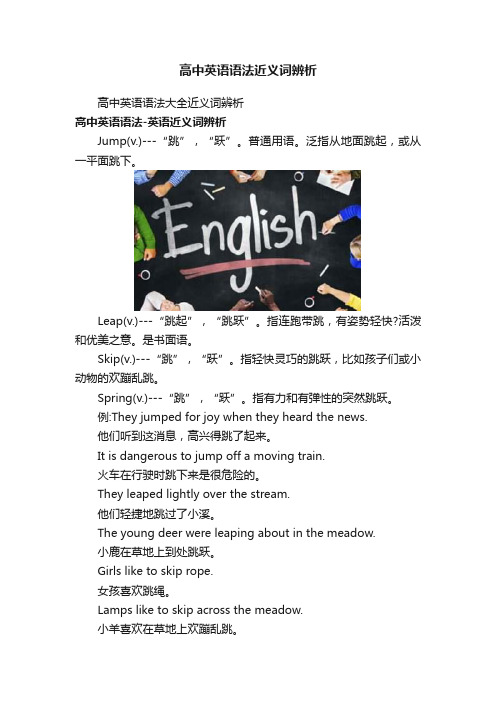
高中英语语法近义词辨析高中英语语法大全近义词辨析高中英语语法-英语近义词辨析Jump(v.)---“跳”,“跃”。
普通用语。
泛指从地面跳起,或从一平面跳下。
Leap(v.)---“跳起”,“跳跃”。
指连跑带跳,有姿势轻快?活泼和优美之意。
是书面语。
Skip(v.)---“跳”,“跃”。
指轻快灵巧的跳跃,比如孩子们或小动物的欢蹦乱跳。
Spring(v.)---“跳”,“跃”。
指有力和有弹性的突然跳跃。
例:They jumped for joy when they heard the news.他们听到这消息,高兴得跳了起来。
It is dangerous to jump off a moving train.火车在行驶时跳下来是很危险的。
They leaped lightly over the stream.他们轻捷地跳过了小溪。
The young deer were leaping about in the meadow.小鹿在草地上到处跳跃。
Girls like to skip rope.女孩喜欢跳绳。
Lamps like to skip across the meadow.小羊喜欢在草地上欢蹦乱跳。
A boy sprang from his seat.一个男孩突然从座位上跳了起来。
He sprang out of bed when the alarm went off.听到警铃响,他从床上跳下来。
Journey, Excursion, Expedition, Tour, Trip, Travel, VoyageJourney(n.)---“旅行”,“旅程”。
普通用语,指陆地上的远程旅行。
Excursion(n.)---“旅行”。
较正式,指海上或陆地上的短期外出。
Expedition(n.)---“旅行”。
指为某一特定目的而组织的艰巨而危险的远征。
Tour(n.)---“周游”。
指途中在许多地方作短暂停留的观光游览。
高考英语中高频近义词或同义词辨析
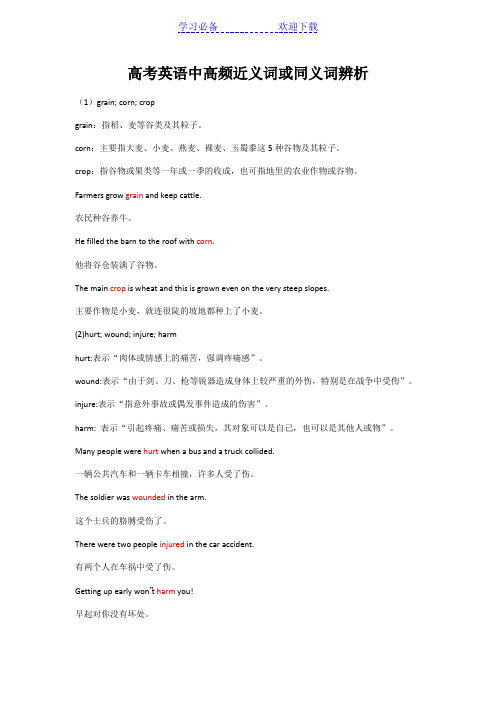
高考英语中高频近义词或同义词辨析(1)grain; corn; cropgrain:指稻、麦等谷类及其粒子。
corn:主要指大麦、小麦、燕麦、裸麦、玉蜀黍这5种谷物及其粒子。
crop:指谷物或果类等一年或一季的收成,也可指地里的农业作物或谷物。
Farmers grow grain and keep cattle.农民种谷养牛。
He filled the barn to the roof with corn.他将谷仓装满了谷物。
The main crop is wheat and this is grown even on the very steep slopes.主要作物是小麦,就连很陡的坡地都种上了小麦。
(2)hurt; wound; injure; harmhurt:表示“肉体或情感上的痛苦,强调疼痛感”。
wound:表示“由于剑、刀、枪等锐器造成身体上较严重的外伤,特别是在战争中受伤”。
injure:表示“指意外事故或偶发事件造成的伤害”。
harm: 表示“引起疼痛、痛苦或损失,其对象可以是自己,也可以是其他人或物”。
Many people were hurt when a bus and a truck collided.一辆公共汽车和一辆卡车相撞,许多人受了伤。
The soldier was wounded in the arm.这个士兵的胳膊受伤了。
There were two people injured in the car accident.有两个人在车祸中受了伤。
Getting up early won‟t harm you!早起对你没有坏处。
(3)affair; thing; matter; businessaffair:意为“事情、事件”, 含义较广,泛指已做或待做的事。
复数affairs一般指商业事务及政府的日常事务,如财政管理、外交事务等。
thing:意为“事情、事物”,不管大事小事、好事坏事均称为thing,一般不能专指事务。
高考英语常用同近义词词汇辨析5
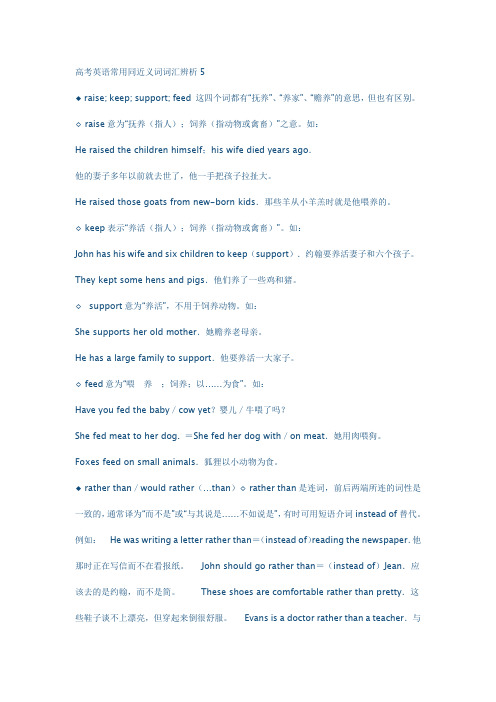
高考英语常用同近义词词汇辨析5◆ raise; keep; support; feed 这四个词都有“抚养”、“养家”、“赡养”的意思,但也有区别。
◇ raise意为“抚养(指人);饲养(指动物或禽畜)”之意。
如:He raised the children himself;his wife died years ago.他的妻子多年以前就去世了,他一手把孩子拉扯大。
He raised those goats from new-born kids.那些羊从小羊羔时就是他喂养的。
◇ kee p表示“养活(指人);饲养(指动物或禽畜)”。
如:John has his wife and six children to keep(support).约翰要养活妻子和六个孩子。
They kept some hens and pigs.他们养了一些鸡和猪。
◇support意为“养活”,不用于饲养动物。
如:She supports her old mother.她赡养老母亲。
He has a large family to support.他要养活一大家子。
◇ feed意为“喂 养;饲养;以……为食”。
如:Have you fed the baby/cow yet?婴儿/牛喂了吗?She fed meat to her dog. =She fed her dog with/on meat.她用肉喂狗。
Foxes feed on small animals.狐狸以小动物为食。
◆ rather than/would rather(…than)◇ rather than是连词,前后两端所连的词性是一致的,通常译为“而不是”或“与其说是……不如说是”,有时可用短语介词instead of替代。
例如:He was writing a letter rather than=(instead of)reading the newspaper.他那时正在写信而不在看报纸。
高中英语近义词组辨析
高中英语近义词(组)辨析2012.01.201.Be able to, can都表示有某种能力。
但can不能用在将来时和完成时。
Can 还可以表示某种可能性,用于推测句式中。
而be able to不能用于推测。
2.Above, on, over.Above:在....上面,不一定是正上方,其反义词是below.On:紧贴在...上面。
其反义词是beneath。
Over:在....正上方。
其反义词是under。
3.Accident, incident, event.incident指小事件, accident指不幸的事故。
如:He was killed in the accident.Event指大的事件,也可用于体育赛事。
4.Accomplish, complete, finish.Accomplish:完成预期目标。
Complete表示经过努力将未完成的事做完,后面只接名词。
Finish:强记完成动作的最后阶段,后面接名词或动名词。
5.Ache, pain.Ache指身体某一部分的隐痛。
Pain泛指疼痛,也指精神上的痛苦。
6.Actual, practical, real, true.Actual指实际存在的,practical指注重实际的切实可行的,real指真实非伪造的,true指与事实相符的。
7.Adequate, enough.Adequate指数量正好,enough指数量充足。
8.Advise, suggest advise:建议,劝说。
例如:I advised (his) trying again. (= suggest)I advised that we (should) try again. (= suggest,虚拟语气。
)I advised him to give up smoking.Could you advise us on how to learn English?suggest:建议,表明,暗示。
高中英语选修 7同义词辨析
同义词辨析选修7unit 1Living well1.annoy,bother,disturb和trouble课本原句】The few who cannot see the real person inside my body do not make me annoyed, and I just ignore them.(page2)annoy vt. “使……不悦;惹恼”,与bother,disturb和trouble是近义词。
【观察例句】The way Tina orders us around really annoys me.蒂娜把我们差来遣去的做法真让我恼火。
It annoyed him that the model didn’t fit together properly.使他懊恼的是这个样品安装不上。
She was annoyed with Duncan for forgetting to phone.邓肯忘了打电话让她很生气。
It’s annoying that we didn’t know ab out this before.令人恼火的是,我们事先并不知道。
Her message bothered me.她的信息让我感到不安。
The thing that bothered me is that she still refused to help me.让我不安的事情是她仍然拒绝帮助我。
I am sorry to disturb you .对不起,打扰您了。
The letter shocked and disturbed me.那封信让我感到震惊和不安。
He was deeply troubled by the court.他对那场官司深深地感到忧虑。
【归纳总结】这几个词都与“打扰,使……忧虑”有关,但它们的用法是不同的。
(1)annoy强调因被迫忍受令人不快、讨厌的事而失去平静或耐心,多指一时的打扰或恼怒。
近义词辨析造句
以下是一些近义词辨析的例子,每个词组都给出了英文和中文的解释,以及一个造句:
1. 近义词:affect 和 effect
英文解释:
affect: to produce an artificial or simulated impression on; pretend.
effect: to produce (a desired result).
中文解释:
affect: 产生一种人为的或模拟的影响;假装。
effect: 产生(期望的结果)。
造句:The actor's affected voice made the audience laugh. 演员装腔作势的嗓音逗得观众发笑。
The new policy has had the desired effect. 新政策取得了预期的效果。
2. 近义词:alone 和 lonely
英文解释:
alone: without companions or company.
lonely: feeling or indicating loneliness.
中文解释:
alone: 没有同伴或陪伴。
lonely: 感到或表现出孤独。
造句:I enjoy being alone in the house. 我喜欢一个人待在屋子里。
He felt lonely even when surrounded by people. 即使周围都是人,他还是感到孤独。
高考英语常见近义词辨析整理
高考英语常见近义词辨析整理近义词是英语考试中常见的辨析题型之一,正确区分近义词对于提高考生的语言表达能力和阅读理解能力非常重要。
以下是高考英语中常见的近义词辨析整理,希望能对考生有所帮助。
1. Difficult vs. Hard这两个词都表示困难的意思,但用法上有所差异。
- Difficult:指一项任务具有复杂性、挑战性或智力要求高。
强调的是任务本身的复杂性。
例如:- This math problem is difficult to solve.- It's difficult to understand the concept of quantum physics.- Hard:指一个人在完成某项任务时遇到了困难。
强调的是个体的能力和努力。
例如:- I found the math problem hard to solve.- He worked hard to understand the concept of quantum physics.2. Accept vs. Except这两个词往往容易混淆,但意思截然不同。
- Accept:表示接受或同意。
例如:- I accept your apology.- The university accepted her application.- Except:表示除了、排除。
例如:- Everyone is here except John.- I like all fruits except for bananas.3. Advise vs. Advice这两个词都与建议有关,但用法有所不同。
- Advise:动词形式,表示提供建议或告诉某人该做什么。
例如:- I advise you to study harder for the exam.- The doctor advised her to get more exercise.- Advice:名词形式,表示建议或忠告。
- 1、下载文档前请自行甄别文档内容的完整性,平台不提供额外的编辑、内容补充、找答案等附加服务。
- 2、"仅部分预览"的文档,不可在线预览部分如存在完整性等问题,可反馈申请退款(可完整预览的文档不适用该条件!)。
- 3、如文档侵犯您的权益,请联系客服反馈,我们会尽快为您处理(人工客服工作时间:9:00-18:30)。
英语中的近义词辨析(1)2008-01-10 13:271. clothes, cloth, clothingclothes统指各种衣服,谓语动词永远是复数,cloth指布,为不可数名词,clothing 服装的总称,指一件衣服a piece of, an article of2. incident, accidentincident指小事件, accident指不幸的事故He was killed in the accident. 3. amount, numberamount后接不可数名词,number后接可数名词a number of students4. family, house, homehome家,包括住处和家人,house房子,住宅,family家庭成员. My family is a happy one.5. sound, voice, noisesound自然界各种各样的声音,voice人的嗓音,noise噪音I hate the loud noise outside.6. photo, picture, drawingphoto用照相机拍摄的照片,picture可指相片,图片,电影片,drawing画的画Let's go and see a good picture.7. vocabulary, wordvocabulary词汇,一个人拥有的单词量,word具体的单词He has a large vocabulary.8. population, peoplepopulation人口,人数,people具体的人China has a large population.9. weather, climateweather一天内具体的天气状况,climate长期的气候状况The climate here is not good for you.10. road, street, path, wayroad具体的公路,马路,street街道,path小路,小径,way道路,途径take this road; in the street, show me the way to the museum.11. course, subjectcourse课程(可包括多门科目),subject科目(具体的学科)a summer course 12. custom, habitcustom传统风俗,习俗,也可指生活习惯,后接to do,habit生活习惯,习惯成自然,后接of doing. I've got the habit of drinking a lot.13. cause, reasoncause指造成某一事实或现象的直接原因,后接of sth./doing sth,reason用来解释某种现象或结果的理由,后接for sth./doing sth. the reason for being late14. exercise, exercises, practiceexercise运动,锻炼(不可数),exercises练习(可数),practice(反复做的)练习Practice makes perfect.15. class, lesson作"课"解时,两者可以替换.指课文用lesson.指班级或全体学生用class. lesson 6; class 516. speech, talk, lecturespeech指在公共场所所做的经过准备的较正式的演说,talk日常生活中的一般的谈话,讲话,lecture学术性的演讲,讲课a series of lecture on…17. officer, officialofficer部队的军官,official政府官员an army officer18. work, job二者均指工作。
work不可数,job可数a good job19. couple, paircouple主要指人或动物,pair多指由两部分组成的东西a pair of trousers 20. country, nation, state, landcountry侧重指版图,疆域,nation指人民,国民,民族,state侧重指政府,政体,land国土,国家The whole nation was sad at the news.21. cook, cookercook厨师,cooker厨具He is a good cook.22. damage, damagesdamage不可数名词,损害,损失; damages复数形式,赔偿金0 damages23. police, policemanpolice警察的总称,后接复数谓语动词,policeman指某个具体的警察The police are questioning everyone in the house.24. problem, questionproblem常和困难连系,前面的动词常为think about, solve, raise,question常和疑问连系,多和ask, answer连用25. man, a manman人类,a man一个男人Man will conquer nature.26. chick, chicken二者均可指小鸡,chicken还可以当鸡肉The chicken is delicious.27. telegram, telegraph当电报解时,telegram指具体的,telegraph指抽象的a telegram, by telegraph 28. trip, journey, travel, voyagetravel是最常用的,trip指短期的旅途,journey指稍长的旅途,voyage指海上航行a three-day trip29. sport, gamesport多指户外的游戏或娱乐活动,如打球,游泳,打猎,赛马等;game指决定胜负的游戏,通常有一套规则His favorite sport is swimming.30. price, prizeprice价格,prize奖,奖品,奖金win the first prize The price is high/low.31. a number of, the number ofa number of许多,谓语动词用复数。
the number of…的数目,谓语动词用单数。
The number of students is increasing.32. in front of, in the front ofin front of范围外的前面,in the front of范围内的前面In the front of the room sits a boy.33. of the day, of a dayof the day每一天的,当时的,当代的,of a day暂时的,不长久的a famous scientist of the day34. three of us, the three of usthree of us我们(不止三个)中的三个,the three of us我们三个(就三个人)The three of us---Tom, Jack and I went to the cinema.35. by bus, on the busby bus表手段,方式,不用冠词,on the bus表范围They went there by bus. 36. for a moment, for the momentfor a moment片刻,一会儿,for the moment暂时,一时Thinking for a moment, he agreed.37. next year, the next yearnext year将来时间状语,the next year过去将来时间状语He said he would go abroad the next year.38. more than a year, more than one yearmore than a year一年多,more than one year超过一年(两年或三年等)39. take advice, take the(one's) advicetake advice征求意见,take the advice接受忠告He refused to take the advice and failed again.40. take air, take the airtake air传播,走漏,take the air到户外去,散步We take the air every day.41. in a word, in wordsin a word总之,一句话,in words口头上In a word, you are right.42. in place of, in the place ofin place of代替,in the place of在…地方A new building is built in the place of the old one.43. in secret, in the secretin secret秘密地,暗自地,偷偷地,一般用作状语;in the secret知道内情,知道秘密,一般用作表语My mother was in the secret from the beginning.44. a girl, one girla girl可泛指所有女孩, one girl一个女孩Can one girl carry such a big box?45. take a chair, take the chairtake a chair相当于sit down坐下,take the chair开始开会46. go to sea, by sea, by the seago to sea当海员,出航,by sea乘船,由海路,by the sea在海边go by sea 47. the doctor and teacher, the doctor and the teacherthe doctor and teacher指一个人,既是医生又是老师,the doctor and the teacher 两个人,一个医生和一个老师the doctor and teacher is48. in office, in the officein office在职的,in the office在办公室里He is in office, not out of office.49. in bed, on the bedin bed卧在床上,on the bed在床上The book is on the bed. He is ill in bed.50. in charge of, in the charge ofin charge of管理,负责照料,in the charge of由……照料He is in charge of the matter. The matter is in the charge of her.英语中的近义词辨析(2)2008-01-10 13:3051. in class, in the classin class在课上,in the class在班级里 He is the best student in the class.52. on fire, on the fireon fire着火,on the fire在火上 Put the food on the fire. The house is on fire.53. out of question, out of the questionout of question毫无疑问的,out of the question不可能的54. a second, the seconda second又一,再一,the second第…… He won the second prize.55. by day, by the dayby day白天,by the day按天计算 The workers are paid by the day.56. the people, a peoplethe people指人,a people指民族 The Chinese is a peace-loving people.57. it, oneit同一物体,one同类不同一 I lost my pen. I have to buy a new one.58. that, thisthat指代上文所提到的,this导出下文所要说的I was ill. That's why…59. none, nothing, no onenone强调有多少,nothing, no one强调有没有,nothing指物,no one指人--- How many…/How much…? --- None.60. anyone, any oneanyone指人,不能接of,any one指人物均可,可接of any one of you61. who, whatwho指姓名或关系,what指职业或地位 What is your dad? He is a teacher.62. what, whichwhat的选择基础是无限制的,which在一定范围内进行选择 Which do you prefer, bananas or apples?63. other, anotherother后接名词复数,another后接名词单数 other students, another student64. not a little, not a bitnot a little非常,not a bit一点也不 I'm not a bit tired. 我一点儿也不累。
